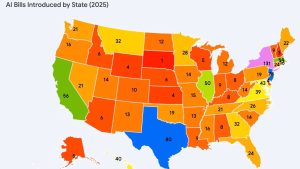The UK Competition and Markets Authority (CMA) has sought views on whether a recently announced partnership between Amazon Anthropic should be investigated as a relevant merger under its Enterprise Act of 2022, and how that partnership might affect competition. When the investigation was announced, CCIA raised concerns with Matthew Sinclair, Senior Director, UK arguing that “CMA should act proportionately and not risk the UK’s hard-won reputation for responsible regulation.”
CCIA today submitted its response to the invitation to comment weighed in with comments in response to that inquiry addressing both the question over whether the partnership has resulted in the creation of a relevant merger situation under the Enterprise Act 2002; and what impact it might have on competition in the UK.
Is this partnership a merger?
The submission notes that there are multiple reasons to believe that the partnership as announced thus far will not enable Amazon to materially influence Anthropic’s commercial strategy, or shape Anthropic’s approach to competition in the sector:
First, Amazon is taking a minority stake in the business, not attaining control of Anthropic as a result of its investment, and Anthropic will continue to exist as a separate entity. Second, there is no exclusivity commitment in the deal, instead there is an active plan to make Anthropic available on a platform (Bedrock), alongside other foundation models, therefore providing customers with increased choice; Anthropic has entered other partnerships and does not appear to be precluded from entering more over time.
The CMA’s investigation reflects its concerns about a potential direction for the wider market, more than the likelihood that the Anthropic / Amazon partnership in itself would materially increase or decrease the scope for competition in the market. There are existing CMA and Federal Trade Commission (FTC) investigations into the market that (if needed) would provide a more practical avenue to consider issues and intervene if necessary.
Given AI is a new rapidly changing sector, the reasons why conduct regulation is subject to specific evidence standards are highly relevant to this partnership, particularly:
- the risk of false positives, where regulators impede pro-competitive behaviours – in this case a partnership that might support the growth of Anthropic as a competitor to other foundation models; and
- potential to chill wider investment – in this case other investors in AI services and potentially wider technology business, as this can be seen as a generalised opposition to one class of investors in scaling technology companies (this concern has recently motivated policymakers to act cautiously in revising the UK’s approach to merger policy).
Even at the level of a candidate definition of supply (the more basic equivalent of market definition used for merger control cases in the UK), there are no definitions in which Amazon and Anthropic have a 25% share and where there would be an identifiable increment in supply. The only area in which the parties appear to overlap is in the development of foundation models, where the CMA identified over 300 competitors, including multiple larger players, and it is implausible that the relevant firms have a share of 25% or more. There are also no credible reports that, absent the partnership under discussion, Anthropic might seek to compete with Amazon in any segment where its share is greater (e.g. cloud IT infrastructure).
Let’s examine the impact the Anthropic partnership could have on competition in the UK
The AI market is nascent and highly dynamic. It is unlikely that any particular partnership will materially diminish competition, without eliciting a dynamic response as other market participants invest in similar capabilities. There is also no theory of harm proposed in the CMA’s ongoing investigation of the Cloud market that implies Amazon would not face a response from competitors in the Cloud market if it tries to extract rents in newer markets.
While the future of the AI market is obviously uncertain, in either of the broad plausible scenarios the risks associated with obstacles to the partnership appear greater.
Scenario 1: dynamic competition
In a scenario with ongoing strong dynamic competition, merger control (particularly controls on partnerships) has significant downside risks, in that it could frustrate the process by which companies enter and gain the capabilities needed to establish new services. By contrast the upside is limited. Even if a partnership (or outright merger) allows an existing company to acquire a future successful firm, any attempt to exploit that outcome by worsening the quality-adjusted price for customers will encourage new entrants to the market (either outright new businesses, or extension from other markets including potentially other parts of the AI market).
Scenario 2: “tipping”
In a “tipping points” scenario where one or more players enjoyed market power, there would be a regulatory framework under which that could be managed (recently extended with the DMCC). While this would clearly be more challenging, it is not one that can be avoided through merger control (particularly given that there are multiple vertically-integrated market participants already).
To the extent that they believe the final market distribution is uncertain, and particularly where there are not any incumbents, firms with important businesses in adjacent sectors might have a strategic incentive to invest in partnerships. The more diverse and competitive an AI market they can support, the larger and healthier the market will be for adjacent services. These investments in turn will support market entry and health of the AI services sector.
The direct effect of delays to the Amazon – Anthropic partnership would be a reduction in the funding immediately available to Anthropic. Given the high pace of innovation in the sector, this would likely incur consequences such as
- A short- to medium-term reduction in the diversity and quality of AI services available to customers.
- A longer-term reduction in the potential for Anthropic to continue to establish itself as a competitor to other foundation model developers. Even in a case where the merger was approved, a lengthy investigation at a point in which innovation is particularly fast-moving could have irreversible impacts on Anthropic’s role in the market.
Firms looking to raise capital to invest in AI services will have fewer potential investors, with wider consequences for their business (e.g. reputational impacts). The longer and more challenging the fundraising process, the greater the resulting chilling effect is likely to be.
In the event of permanent obstacles to partnerships, the immediate impact would be less efficient development of AI and other innovations, and narrowing of the competitive field to existing well-capitalised companies. It raises the risk that smaller providers would not be able to access the resources of more established companies and those more established companies have fewer routes to improve services for consumers.



